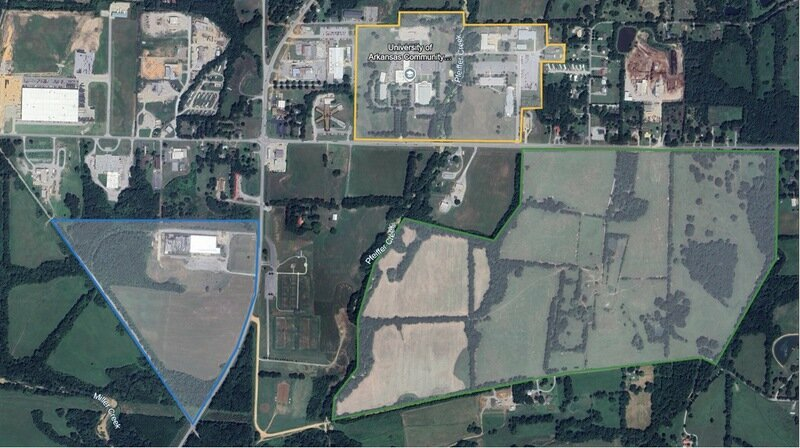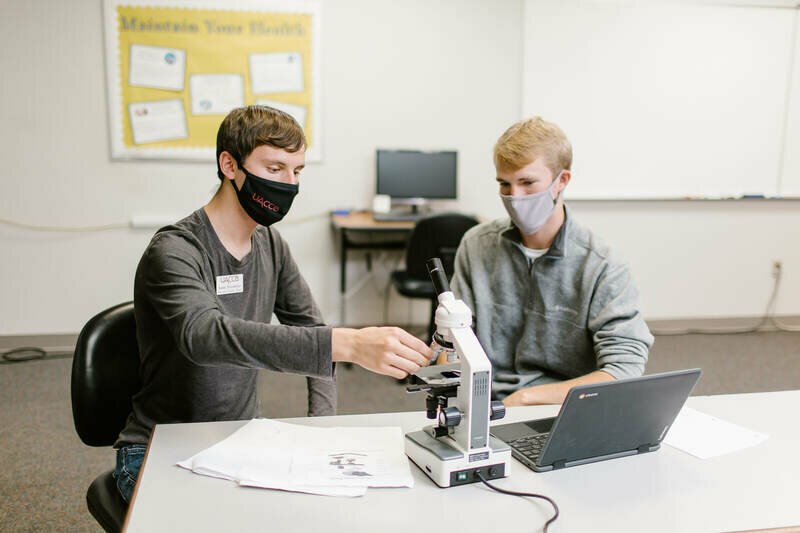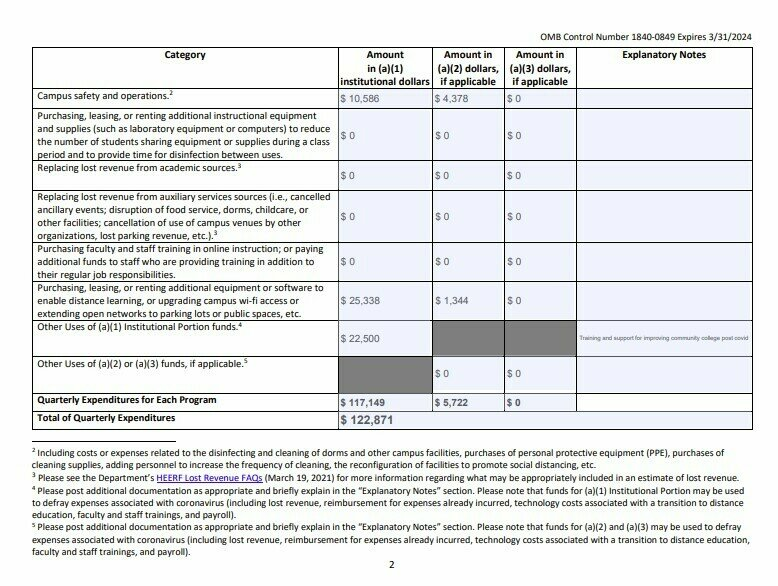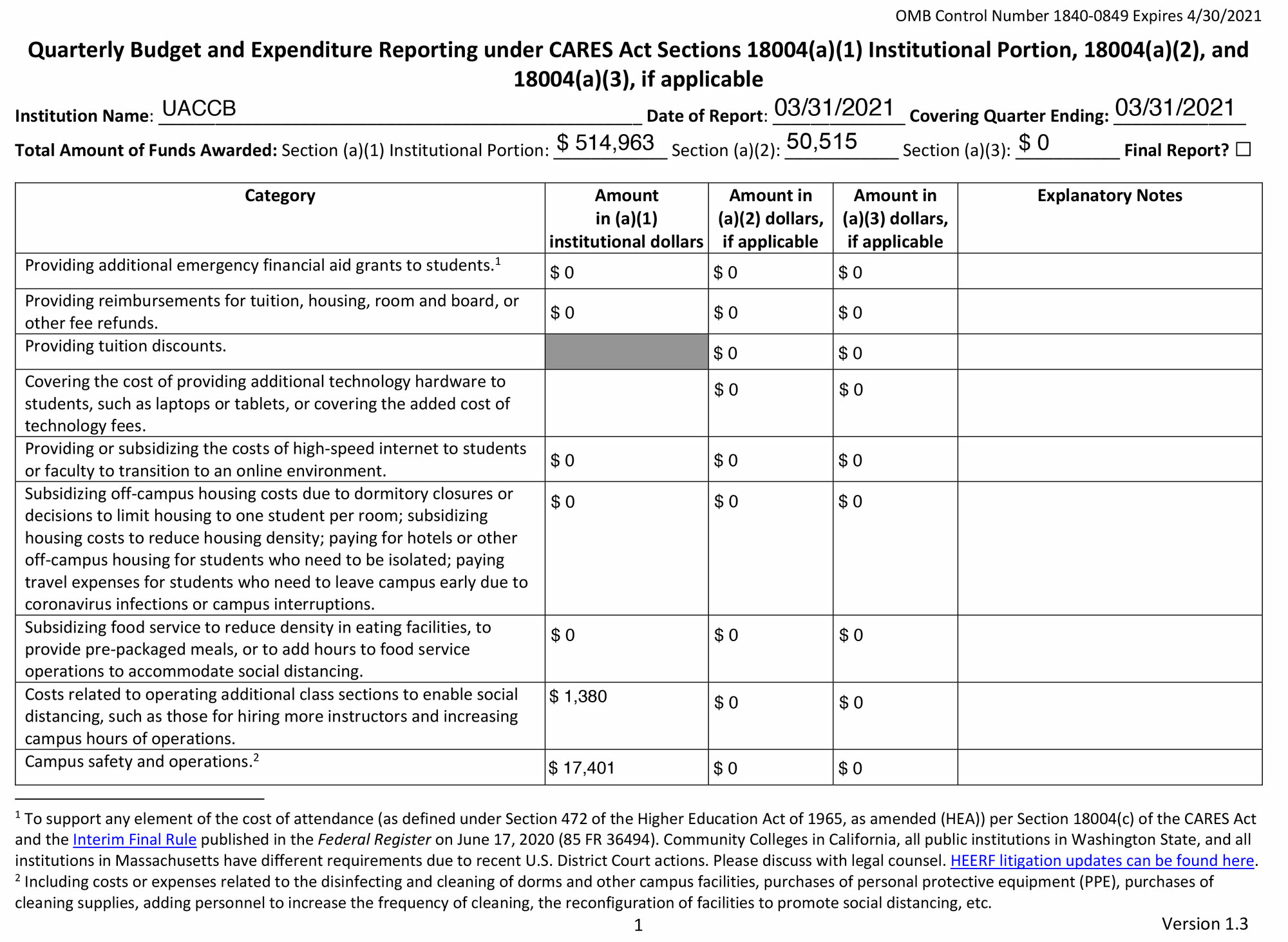Explore the latest news, announcements, and achievements from the University of Arkansas Community College at Batesville. Stay informed about campus events, student success stories, and important college updates. For media inquiries, please contact communications@uaccb.edu.
News

UACCB Prioritizes Student Success, Earning National Recognition and Expanding Programs
Posted Date: December 9, 2025

The Aspen Institute Names The University of Arkansas Community College at Batesville as a Top 200 U.S. Community College Eligible for the 2027 Aspen Prize
Posted Date: October 28, 2025

UACCB Exceeds Enrollment Goal and Remains on Top for Graduation and Retention
Posted Date: September 8, 2025

UACCB Secures 207-Acre Lease for New Farm and Ranch Management Program, Thanks to Generous Families
Posted Date: August 4, 2025

UACCB Announces Spring 2025 Chancellor’s and Vice Chancellor’s Lists
Posted Date: May 22, 2025

UACCB Student Kali Combs Awarded 2025 Rutherford Mini-Grant
Posted Date: May 15, 2025

Josey Duncan Named 2025 New Century Transfer Pathway Scholar
Posted Date: April 17, 2025

Student Spotlight: Ashley Cunningham
Posted Date: February 28, 2025

UACCB Continuing Participation in National Initiative to Help Rural Community College Students Succeed
Posted Date: February 13, 2025

Student Spotlight: Josey Duncan
Posted Date: February 3, 2025

UACCB Announces Fall 2024 Chancellor’s and Vice Chancellor’s Lists
Posted Date: January 23, 2025

UACCB Celebrates 2024 Fall Graduates at Commencement Ceremony
Posted Date: December 18, 2024

UACCB Unveils Fall Lineup of Free and Low-Cost Training Programs
Posted Date: October 1, 2024

UACCB Announces 3rd Annual Run the College 5K
Posted Date: September 12, 2024

Scott Phillips Hired as Director of Industry and Community Partnerships at UACCB
Posted Date: September 10, 2024

UACCB and Reach University Partner on Apprenticeships
Posted Date: September 6, 2024

UACCB Announces Spring 2024 Chancellor’s and Vice Chancellor’s Lists
Posted Date: June 24, 2024

UACCB Receives $368,614 Grant for Nursing Program Expansion and Enhancements
Posted Date: May 13, 2024

UACCB Announces 2023-2024 Graduates
Posted Date: May 8, 2024

UACCB Student Team Among 12 Advancing to National Community College Innovation Challenge Finals
Posted Date: May 3, 2024

Community College Month Featured Student: Clara Keener
Posted Date: April 30, 2024

Community College Month Featured Student: Shanna Huffine
Posted Date: April 29, 2024

Community College Month Featured Student: Will Jones
Posted Date: April 26, 2024

Community College Month Featured Student: Sydney Blackman
Posted Date: April 22, 2024

Community College Month Featured Student: Shelby Coombe
Posted Date: April 19, 2024

Fulfilling the Dream: Alli Scales
Posted Date: February 22, 2024

UACCB Announces Fall 2023 Chancellor's and Vice Chancellor's Lists
Posted Date: January 9, 2024

UACCB Celebrates the Success of Registered Nursing Students at Pinning Ceremony
Posted Date: December 8, 2023

UACCB Receives $277,440 Advanced Technological Education Grant from the National Science Foundation
Posted Date: December 5, 2023

UACCB Announces 2nd Annual Run the College 5K
Posted Date: October 13, 2023

The Aspen Institute Names UACCB as a Top 150 U.S. Community College Eligible for the 2025 Aspen Prize
Posted Date: October 10, 2023

UACCB Student Eli Skelton Awarded Scholarship from the Regional Industrial Safety Alliance (RISA)
Posted Date: October 3, 2023

Intimidator Group Announces Partnership With The University of Arkansas Community College at Batesville
Posted Date: September 21, 2023

UACCB Fall 2023 Enrollment Reaches a 4-Year High
Posted Date: September 15, 2023

UACCB Celebrates the Success of Students on the Registered Nursing State Licensure Examination
Posted Date: August 18, 2023

UACCB Alumna Share Her Silver Lining Story
Posted Date: August 4, 2023

UACCB Celebrates the Success of Practical Nursing Students at Pinning Ceremony
Posted Date: August 1, 2023

UACCB Celebrates the Success of Paramedic Students at Coining Ceremony
Posted Date: July 24, 2023

UACCB announces Academic All-Star and Outstanding Alumni
Posted Date: June 23, 2023

UACCB Announces Outstanding Faculty and Staff, Recognizes Years of Service
Posted Date: June 21, 2023

Cave City High School Students Apply Skills at UACCB Gateway Center
Posted Date: June 16, 2023

UACCB Announces Spring 2023 Chancellor’s and Vice Chancellor’s List
Posted Date: June 13, 2023

UACCB Announces 2022-2023 Graduates
Posted Date: May 16, 2023

UACCB Student Receives Debate Scholarship to UCA
Posted Date: April 28, 2023

Partners Contribute $100,000 for UACCB Expansion
Posted Date: April 21, 2023

UACCB Registration Opens March 29, Expanded Scholarships Available
Posted Date: March 29, 2023

UACCB Acquires Property to Expand Workforce Training in Region
Posted Date: March 14, 2023

Jack and Judy Lassiter Reflect on Early UACCB for its 25th Anniversary
Posted Date: March 10, 2023

UACCB Robotics Team Places Second in State Competition
Posted Date: March 6, 2023

UACCB Debate Team Competes at Tournament
Posted Date: March 1, 2023

TRIO Student Support Services celebrates success at UACCB
Posted Date: February 27, 2023

Fulfilling the Dream - Markas Johnson
Posted Date: February 20, 2023

Fulfilling the Dream - Brenda Jones
Posted Date: February 13, 2023

UACCB Fall 2022 Chancellor's, Vice Chancellor's Lists Announced
Posted Date: January 23, 2023

Housh Named Director of Nursing at UACCB
Posted Date: January 11, 2023

UACCB Hosts Best-Selling Author Mark C. Perna
Posted Date: January 3, 2023

Lyon College and UACCB sign transfer agreements
Posted Date: December 15, 2022

UACCB Pins 2022 Registered Nursing Students
Posted Date: December 14, 2022

UACCB Debate Team competes in Red River Classic
Posted Date: November 16, 2022

Run the College 5k Raises Money for Student Emergency Fund
Posted Date: November 9, 2022

UACCB opens registration for new and readmitted students
Posted Date: November 8, 2022

UACCB ESL Classes Help Student Gain Workplace Communication Skills
Posted Date: November 7, 2022

Vanegas joins UACCB as Community Liaison
Posted Date: October 27, 2022

UACCB sees enrollment increase for fall
Posted Date: October 19, 2022

UACCB to hold Run the College 5k
Posted Date: October 7, 2022

UACCB Student Starts Career Early With GED Classes
Posted Date: October 3, 2022

UACCB installs electric vehicle charging station
Posted Date: September 23, 2022

UACCB to celebrate 25th anniversary as University of Arkansas system school
Posted Date: September 20, 2022

Pearce joins UACCB Board of Visitors
Posted Date: August 26, 2022

Warren named dean of health professions
Posted Date: August 22, 2022

UACCB Career Coach program adds two districts
Posted Date: August 8, 2022

UACCB Unveils Commemorative Logo
Posted Date: August 1, 2022

UACCB Pins 2022 Practical Nursing Students
Posted Date: July 28, 2022

UACCB Recognizes 2022 Graduating Paramedics
Posted Date: July 25, 2022

UACCB Receives Additional Regional Workforce Grant
Posted Date: July 19, 2022

UACCB Student Receives Grant Honoring Batesville Native, Skip Rutherford
Posted Date: June 22, 2022

UACCB Releases 2022 Spring Chancellor's, Dean's Lists
Posted Date: May 26, 2022

UACCB Announces Outstanding Faculty, Staff and Recognizes Years of Service
Posted Date: May 24, 2022

From UACCB to Lyon College, First-Generation Student Works Toward Goal
Posted Date: May 12, 2022

UACCB Announces 2021-2022 Graduates
Posted Date: May 10, 2022

First-Generation College Student Strives for Success at U of A
Posted Date: May 5, 2022

Transfer Opportunities Await UACCB Student Seeking Hands-on Career
Posted Date: April 28, 2022

UACCB Welcomes Hankins as Chief Financial Officer
Posted Date: April 22, 2022

UACCB STEM/Pre-Engineering Student to Make the Move to UA Fayetteville
Posted Date: April 21, 2022

UACCB Announces Student Awards
Posted Date: April 20, 2022

UACCB Hosts Simulated Disaster Exercise to Train Students
Posted Date: April 15, 2022

UACCB JAG Program Helps Student Transfer to A-State
Posted Date: April 14, 2022

UACCB to Hold Disaster Simulation Exercise Wednesday
Posted Date: April 11, 2022

Smith named as Vice Chancellor for Academic Affairs
Posted Date: March 28, 2022

Magician and Autism Advocate Cody Clark to Perform at UACCB
Posted Date: March 10, 2022

Fulfilling the Dream - UACCB Early Childhood Education Student Stays the Course
Posted Date: February 28, 2022

Fulfilling the Dream - UACCB Nursing Student Overcomes Challenges
Posted Date: February 22, 2022

UACCB Selected as 1 of 8 in U. S. for Program
Posted Date: January 31, 2022

Shannon Haney Hired as UACCB Director of Development
Posted Date: January 25, 2022

UACCB Releases 2021 Fall Chancellor's, Dean's Lists
Posted Date: January 14, 2022

Bobbitt to Recommend Shonk as Next Chancellor at UACCB
Posted Date: November 17, 2021

UACCB Students Visit University of Arkansas at Fayetteville
Posted Date: November 8, 2021

Four Finalists in Search for UACCB Chancellor Set Campus Visit Forums
Posted Date: October 14, 2021

UACCB Student to Compete in Tetris World Championship
Posted Date: October 7, 2021

Four Finalists Selected in Search for UACCB Chancellor
Posted Date: October 4, 2021

UACCB Receives Over $1,000,000 for Workforce Development Program
Posted Date: September 29, 2021

UACCB Opens State-of-the-Art Workforce Training Center
Posted Date: September 22, 2021

Workforce Training Center Open House and Community Picnic
Posted Date: September 14, 2021

Better Teaching Makes for Better Learning at UACCB
Posted Date: August 30, 2021

Concurrent Classes Kick Off Across Batesville
Posted Date: August 23, 2021

UACCB Provides Students Additional Pandemic Aid
Posted Date: August 16, 2021

Powerhouse Partnership Creates Success for Local Students and Workforce
Posted Date: August 12, 2021

UACCB Announces COVID-19 Mask Plan for Fall 2021
Posted Date: August 11, 2021

Back to School Means More Than Ever in 2021
Posted Date: August 2, 2021

More Than a Two-Year Degree: UACCB Creates Foundation for Lifelong Student Success
Posted Date: July 26, 2021

Quarterly Budget and Expenditure Reporting for HEERF I, II, and III
Posted Date: July 23, 2021

First Responders Complete Course
Posted Date: July 23, 2021

Higher Education Emergency Relief Fund (HEERF) - Grant to Students
Posted Date: July 1, 2021

Recruitment Efforts, Program Additions Highlighted at UACCB Board of Visitors Meeting
Posted Date: June 15, 2021

UACCB receives $525,000 in Regional Workforce Grant Funds
Posted Date: June 7, 2021

UACCB Releases 2021 Spring Chancellor’s, Dean’s Lists
Posted Date: June 4, 2021

UACCB Chancellor 'Position Profile' Finalized
Posted Date: June 2, 2021

Jay Weatherford named 2021 UACCB Outstanding Alumni
Posted Date: May 20, 2021

UACCB Awards Over $1 Million in Federal Student Aid to Help Students Through Pandemic
Posted Date: May 18, 2021

Mask Mandate on Campus Lifted
Posted Date: May 11, 2021

Quarterly Budget and Expenditure Reporting Under CARES Act
Posted Date: May 10, 2021

Bobbitt Names Perrine to Lead UACCB as Interim Chancellor Beginning June 1
Posted Date: May 3, 2021

Bobbitt Announces Search Committee for UACCB Chancellor
Posted Date: April 14, 2021

UACCB Will Continue to Follow Mask Use, Social Distancing Protocols
Posted Date: March 31, 2021

Two UACCB Students Awarded Scholarships From Gene Haas Foundation
Posted Date: March 4, 2021

Fulfilling the Dream - UACCB Student Thrives in Fast-Paced Medical Environment
Posted Date: February 25, 2021

Grant Funding Providing Additional Educational Opportunities for UACCB Faculty, Students
Posted Date: February 21, 2021

Fulfilling the Dream - UACCB Nursing Student Pursuing the American Dream
Posted Date: February 18, 2021

Fulfilling the Dream - Former Merchant Marine Starting Second Chapter in Life at UACCB
Posted Date: February 11, 2021

Fulfilling the Dream - Student Stays the Course on Trail to Achieving Dream of Being a Vet
Posted Date: February 4, 2021

Wright Joins UACCB Board of Visitors
Posted Date: February 3, 2021

UACCB Releases Fall 2020 Chancellor's and Dean's Lists
Posted Date: January 26, 2021

Cooper Retires From Career in Higher Education Finance
Posted Date: January 11, 2021